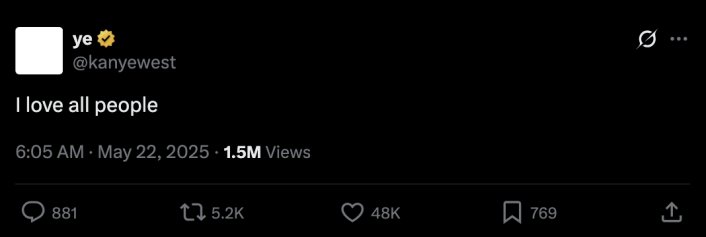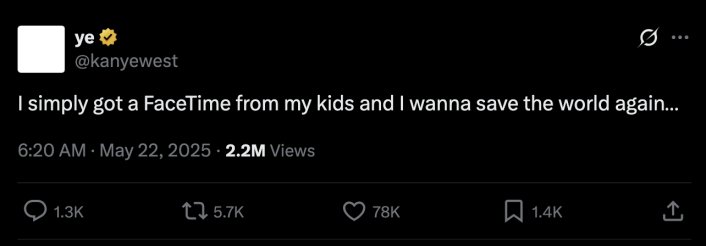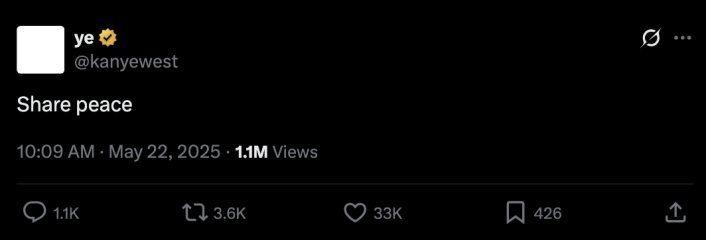Kanye West—now legally known as Ye—took to X (formerly Twitter) on Thursday (May 22) to issue a rare statement of remorse following a years-long pattern of incendiary comments, many of which have been widely condemned as antisemitic, misogynistic, and homophobic.
“I am done with antisemitism. I love all people. God forgive me for the pain I’ve caused. I forgive those who have caused me pain. Thank you God,” Ye wrote. He followed with a more personal note: “I simply got a FaceTime from my kids and I wanna save the world again. Share peace. Share love.”
The statement comes after more than two years of backlash and public fallout following Ye’s antisemitic outbursts—most notably his now-infamous 2022 tweet, where he said he was going “death con 3 on Jewish people.” The post, which played on the military term "DEFCON," was quickly met with outrage and condemnation across industries and communities. It also marked the beginning of a rapid professional unraveling for the once-billionaire rapper, producer, and fashion mogul.
Following that tweet, Ye lost a string of lucrative brand partnerships, most notably his multibillion-dollar collaboration with adidas, which terminated their deal and ceased production of Yeezy products. Other companies followed suit, including Balenciaga, Universal Music Group, and Gap. Ye’s fall from grace was swift and public, as his net worth reportedly plummeted and his influence in the fashion and music industries took a significant hit.
In 2023, Ye issued what many saw as a half-hearted apology to Jewish communities, only to reignite controversy in 2025 with renewed antisemitic rhetoric. His attempt to release a song titled “Heil Hitler” earlier this year caused uproar and was swiftly banned from all major streaming platforms, further alienating fans, collaborators, and industry insiders.
Beyond antisemitism, Ye has also used X and other platforms to espouse homophobic and sexist views, often under the guise of religious or political commentary. His online presence has become increasingly erratic in recent years, at times bordering on conspiratorial. His interviews have included praise for Adolf Hitler, defenses of slavery as a “choice,” and attacks on fellow artists, journalists, and activists.
Despite the controversies, Ye has maintained a loyal fanbase and continues to produce music, albeit largely outside the mainstream industry pipeline. His recent posts suggest a man torn between the chaos he’s created and a desire for redemption, possibly fueled by his relationship with his children.
While his latest apology has drawn mixed reactions—with some cautiously optimistic and others skeptical of its sincerity—it marks the first time in over a year that Ye has publicly acknowledged the harm caused by his statements in such direct terms.
Whether this signals a true turning point or simply another phase in a long pattern of public spectacle remains to be seen.
Source: X







